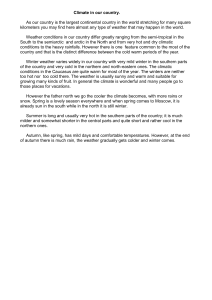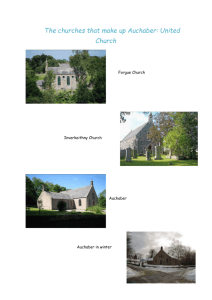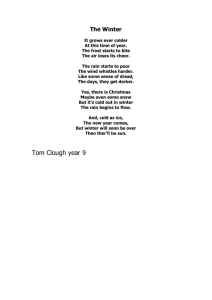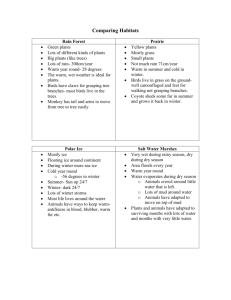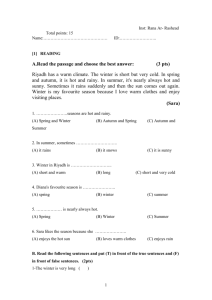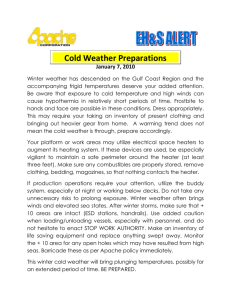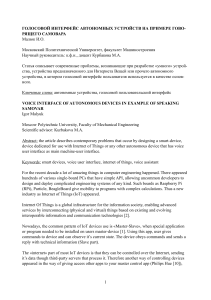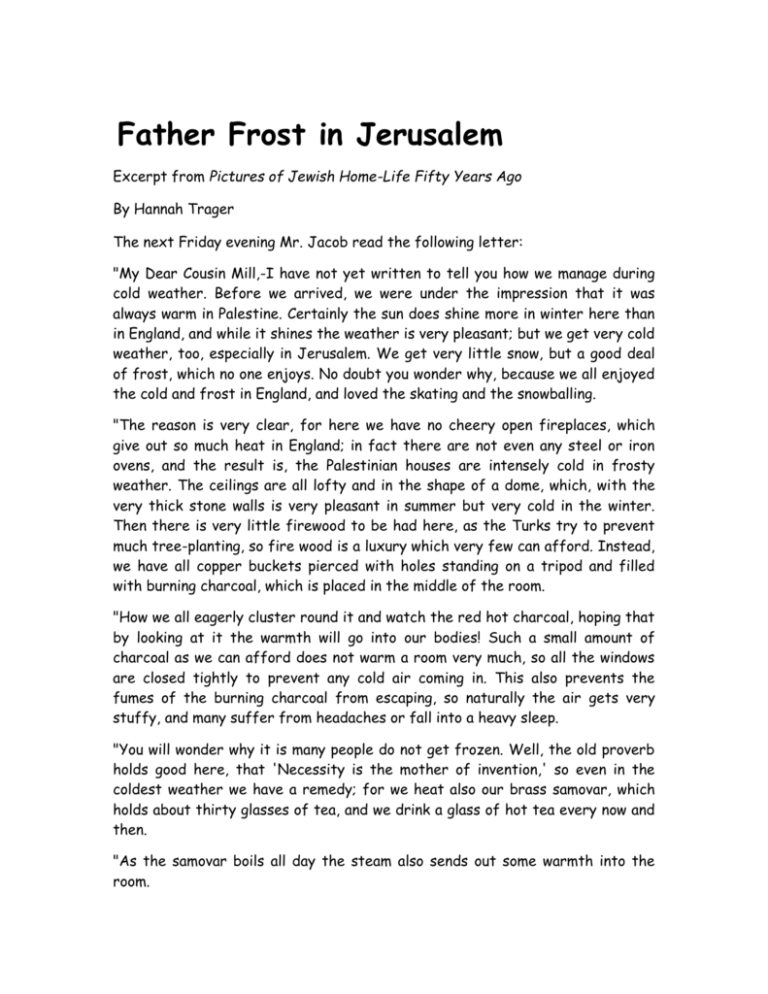
Father Frost in Jerusalem
Excerpt from Pictures of Jewish Home-Life Fifty Years Ago
By Hannah Trager
The next Friday evening Mr. Jacob read the following letter:
"My Dear Cousin Mill,-I have not yet written to tell you how we manage during
cold weather. Before we arrived, we were under the impression that it was
always warm in Palestine. Certainly the sun does shine more in winter here than
in England, and while it shines the weather is very pleasant; but we get very cold
weather, too, especially in Jerusalem. We get very little snow, but a good deal
of frost, which no one enjoys. No doubt you wonder why, because we all enjoyed
the cold and frost in England, and loved the skating and the snowballing.
"The reason is very clear, for here we have no cheery open fireplaces, which
give out so much heat in England; in fact there are not even any steel or iron
ovens, and the result is, the Palestinian houses are intensely cold in frosty
weather. The ceilings are all lofty and in the shape of a dome, which, with the
very thick stone walls is very pleasant in summer but very cold in the winter.
Then there is very little firewood to be had here, as the Turks try to prevent
much tree-planting, so fire wood is a luxury which very few can afford. Instead,
we have all copper buckets pierced with holes standing on a tripod and filled
with burning charcoal, which is placed in the middle of the room.
"How we all eagerly cluster round it and watch the red hot charcoal, hoping that
by looking at it the warmth will go into our bodies! Such a small amount of
charcoal as we can afford does not warm a room very much, so all the windows
are closed tightly to prevent any cold air coming in. This also prevents the
fumes of the burning charcoal from escaping, so naturally the air gets very
stuffy, and many suffer from headaches or fall into a heavy sleep.
"You will wonder why it is many people do not get frozen. Well, the old proverb
holds good here, that 'Necessity is the mother of invention,' so even in the
coldest weather we have a remedy; for we heat also our brass samovar, which
holds about thirty glasses of tea, and we drink a glass of hot tea every now and
then.
"As the samovar boils all day the steam also sends out some warmth into the
room.
"Then, again, the younger children are during the very cold weather kept warm
in bed with feather coverlets and pillows, which the elder people try to keep
warm in doing the necessary household duties. Very few go out in the streets,
except the men when they go to Shule, and the elder boys when they go to the
Yeshiba or Cheder, and even they are very often kept at home.
"One comfort is that 'Father Frost' does not stay long, so we can manage to
bear his icy breath: the greatest hardship is when he visits us on a Sabbath, for
of course on that day we cannot heat the samovar and so we have to do with
less tea.
"We prepare our Sabbath meals in a small scullery, or porch, in which a small
brick oven is built to keep the food hot for the Sabbath. A few pieces of wood
are put in, and, when well lighted, the oven is half-filled with charcoal-dust-this
again is covered by pieces of tin or lime, and, on top of all, the saucepans are put
containing food for the Sabbath meals: also bottles or jars of water are thus
kept hot for tea or coffee. Neighbors who are not lucky enough to have such an
oven bring in their food, and we let them put it in our ovens. In this way we have
enough for every one to drink who may come in. Sometimes twenty poor people
come in on a Sabbath day and say: 'Spare me, please, a little hot water?' No one
would think of refusing to give them some, even if they had to share their last
glass with them.
"Generally on cold Sabbath afternoons our parents have a nap after eating the
nice hot cholent, and we girls and the young married women go and spend a few
hours with our old lady friend, who always entertains us with stories and
discussions on various interesting subjects. So the time passes very quickly and
so pleasantly that we forget how cold it is. About twenty or thirty of us all sit
close together on her divan covered up with rugs, and this with the excitement
over the tales she tells us, helps to keep us warm…
"In my next letter I will tell you of our friend's engagement and marriage.
Your loving cousin, Millie."
© 2012 ReadWorks®, Inc. All rights reserved.
Adapted from www.readworks.com
Answer the following questions based on what you have just read.
1. When is the family unable to light the samovar?
A during Sabbath
B during the day
C during the night
D during the winter
2. Which of the following does the passage NOT state as a way the family keeps
warm in their home?
A drink tea
B coverlets and pillows
C burning charcoal
D burning firewood
3. Based on the passage, what might Millie discuss in her next letter?
A the summers in Palestine
B where to find firewood
C how to make tea in a samovar
D engagement and marriage
4. Read the following sentence:
“The ceilings are all lofty and in the shape of a dome, which, with the very thick
stone walls is very pleasant in summer but very cold in the winter.”
What does the word lofty mean?
A round
B thick
C tall
D wide
5. Why is Millie most likely writing this letter?
A to describe life and the winter in England
B to describe life and the winter in Palestine
C to describe cooking practices in Palestine
D to describe her social circles and activities in Palestine
6. Why are Palestinian houses cold in the winter?
___________________________________________________________
___________________________________________________________
___________________________________________________________
___________________________________________________________
___________________________________________________________
7. Based on its use in the story, what does the following proverb most likely
mean: “Necessity is the mother of invention”? Use evidence from the story to
support your answer.
___________________________________________________________
___________________________________________________________
___________________________________________________________
___________________________________________________________
___________________________________________________________
___________________________________________________________
Answer Key:
1. When is the family unable to light the samovar?
A during Sabbath
B during the day
C during the night
D during the winter
2. Which of the following does the passage NOT state as a way the family keeps
warm in their home?
A drink tea
B coverlets and pillows
C burning charcoal
D burning firewood
3. Based on the passage, what might Millie discuss in her next letter?
A the summers in Palestine
B where to find firewood
C how to make tea in a samovar
D engagement and marriage
4. Read the following sentence: “The ceilings are all lofty and in the shape of a
dome, which, with the very thick stone walls is very pleasant in summer but very
cold in the winter.”
What does the word lofty mean?
A round
B thick
C tall
D wide
5. Why is Millie most likely writing this letter?
A to describe life and the winter in England
B to describe life and the winter in Palestine
C to describe cooking practices in Palestine
D to describe her social circles and activities in Palestine
6. Why are Palestinian houses cold in the winter?
Suggested answer: Palestinian houses are cold in the winter because there are no
fireplaces, no steel or iron ovens, and little firewood. In addition, because the
summer is usually so hot, the ceilings are really high and rounded making them
cooler in the summer, but really cold in the winter. Since firewood is a luxury, Millie
and many people like her only have small copper buckets where they use coal to
warm a house, which doesn’t work so well.
7. Based on its use in the story, what does the following proverb most likely mean:
“Necessity is the mother of invention”? Use evidence from the story to support
your answer.
Suggested answer: “Necessity is the mother of invention” means that difficult
situations often inspire ingenious solutions. In the case of the story, Millie shares
how hard it is to get warm in Jerusalem in the winter. The lack of fire wood, the
construction of the buildings, etc. all pose a challenge or difficulty. Out of
necessity to not freeze to death, people used their samovars to not only drink hot
tea regularly, but also to boil water in all day so the steam served as a heat source
as well. The samovar which is meant to make tea, became a heat source as well out
of necessity to keep warm.

